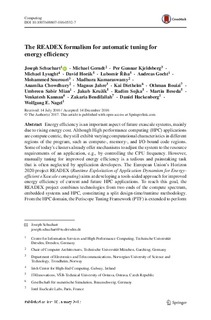| dc.contributor.author | Schuchart, Joseph | |
| dc.contributor.author | Gerndt, Michael | |
| dc.contributor.author | Kjeldsberg, Per Gunnar | |
| dc.contributor.author | Lysaght, Michael | |
| dc.contributor.author | Horák, David | |
| dc.contributor.author | Říha, Lubomír | |
| dc.contributor.author | Gocht, Andreas | |
| dc.contributor.author | Sourouri, Mohammed | |
| dc.contributor.author | Kumaraswamy, Madhura | |
| dc.contributor.author | Chowdhury, Anamika | |
| dc.contributor.author | Jahre, Magnus | |
| dc.contributor.author | Diethelm, Kai | |
| dc.contributor.author | Bouizi, Othman | |
| dc.contributor.author | Mian, Umbreen Sabir | |
| dc.contributor.author | Kružík, Jakub | |
| dc.contributor.author | Sojka, Radim | |
| dc.contributor.author | Beseda, Martin | |
| dc.contributor.author | Kannan, Venkatesh | |
| dc.contributor.author | Bendifallah, Zakaria | |
| dc.contributor.author | Hackenberg, Daniel | |
| dc.contributor.author | Nagel, Wolfgang E. | |
| dc.date.accessioned | 2017-03-22T14:28:18Z | |
| dc.date.available | 2017-03-22T14:28:18Z | |
| dc.date.created | 2017-02-10T10:38:49Z | |
| dc.date.issued | 2017 | |
| dc.identifier.citation | Computing. 2017. | nb_NO |
| dc.identifier.issn | 0010-485X | |
| dc.identifier.uri | http://hdl.handle.net/11250/2435059 | |
| dc.description.abstract | Energy efficiency is an important aspect of future exascale systems, mainly due to rising energy cost. Although High performance computing (HPC) applications are compute centric, they still exhibit varying computational characteristics in different regions of the program, such as compute-, memory-, and I/O-bound code regions. Some of today’s clusters already offer mechanisms to adjust the system to the resource requirements of an application, e.g., by controlling the CPU frequency. However, manually tuning for improved energy efficiency is a tedious and painstaking task that is often neglected by application developers. The European Union’s Horizon 2020 project READEX (Runtime Exploitation of Application Dynamism for Energy-efficient eXascale computing) aims at developing a tools-aided approach for improved energy efficiency of current and future HPC applications. To reach this goal, the READEX project combines technologies from two ends of the compute spectrum, embedded systems and HPC, constituting a split design-time/runtime methodology. From the HPC domain, the Periscope Tuning Framework (PTF) is extended to perform dynamic auto-tuning of fine-grained application regions using the systems scenario methodology, which was originally developed for improving the energy efficiency in embedded systems. This paper introduces the concepts of the READEX project, its envisioned implementation, and preliminary results that demonstrate the feasibility of this approach. | nb_NO |
| dc.language.iso | eng | nb_NO |
| dc.publisher | Springer Verlag | nb_NO |
| dc.relation.uri | http://link.springer.com/article/10.1007/s00607-016-0532-7 | |
| dc.rights | Navngivelse 4.0 Internasjonal | * |
| dc.rights.uri | http://creativecommons.org/licenses/by/4.0/deed.no | * |
| dc.title | The READEX formalism for automatic tuning for energy efficiency | nb_NO |
| dc.type | Journal article | nb_NO |
| dc.type | Peer reviewed | nb_NO |
| dc.source.pagenumber | 19 | nb_NO |
| dc.source.journal | Computing | nb_NO |
| dc.identifier.doi | 10.1007/s00607-016-0532-7 | |
| dc.identifier.cristin | 1449196 | |
| dc.relation.project | EU/671657 | nb_NO |
| dc.description.localcode | © The Author(s) 2017. This article is published with open access at Springerlink.com. This article is distributed under the terms of the Creative Commons Attribution 4.0 International License (http://creativecommons.org/licenses/by/4.0/), which permits unrestricted use, distribution, and reproduction in any medium, provided you give appropriate credit to the original author(s) and the source, provide a link to the Creative Commons license, and indicate if changes were made. | nb_NO |
| cristin.unitcode | 194,63,35,0 | |
| cristin.unitcode | 194,63,10,0 | |
| cristin.unitname | Institutt for elektronikk og telekommunikasjon | |
| cristin.unitname | Institutt for datateknikk og informasjonsvitenskap | |
| cristin.ispublished | true | |
| cristin.fulltext | original | |
| cristin.qualitycode | 1 | |

